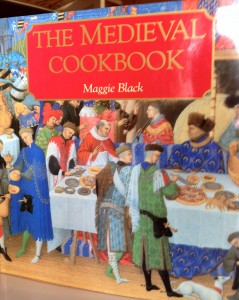Happy times, you medievalists
A former co-worker, who now lives in Ireland, posted a message that today, March 31, is Hug a Medievalist Day. That makes me happy.
I love medieval literature and history, so when I learned what day it is, I pulled out Maggie Black’s “The Medieval Cookbook,” written in 1992. I bought it not so much for the recipes all those years  ago, but for the illustrations. There’s a scene from the Bayeux Tapestry from the 11th century of making a stew and grilling steaks. There is a chapter on Geoffrey Chaucer’s characters from “The Canterbury Tales” and another on life in the cloisters.
ago, but for the illustrations. There’s a scene from the Bayeux Tapestry from the 11th century of making a stew and grilling steaks. There is a chapter on Geoffrey Chaucer’s characters from “The Canterbury Tales” and another on life in the cloisters.
The recipes have been rendered into modern English with appropriate measurements in cups and tablespoons.
I joked about eel stew to my former co-worker, but didn’t find a recipe for it. I did find one for pike, which is a freshwater predator that is abundant even today in Irish waterways. Pike, apparently, are opportunistic feeders that prey on small fish such as rudd and eels. They have a long, mottled body and a nasty set of teeth.
As I flipped through the book, I came across a recipe for golden leeks and onions. That didn’t sound too far off from what we had last night, even before I knew about Hug a Medievalist Day. We had fixed leek and potato soup, which I blogged about last May.
The golden leeks and onions recipe made it into “The Medieval Cookbook” because the Summoner in Chaucer’s company loved to eat those vegetables. Author Black surmises that he would like the recipe she included even without it being served with “smale bryddes” (small blackbirds or finches) in the pot.
On the other hand, I learned that butter during Lent was not allowed. That and the milk would have excluded my soup recipe. The Lenten rules were nothing to scoff at: “Lent, which lasted six weeks then as now, and was the only time when eggs and dairy foods were banned as well as meat, was rigidly kept, at least in name,” Black writes.
